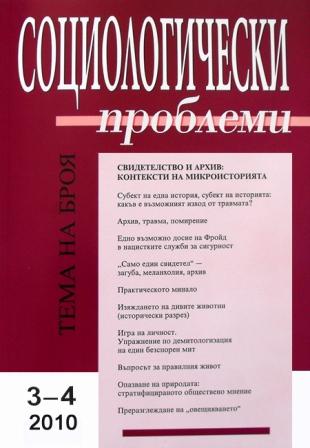„Само един свидетел" — загуба, меланхолия, архив (биографичният случай Дорина Илиева-Симпсън)
„Just One Witness" - Loss, Melancholy, and Archive (Biographical Case Dorina Ilieva-Simpson)
Author(s): Snezhana DimitrovaSubject(s): Social Sciences
Published by: Институт по философия и социология при БАН
Summary/Abstract: This text stands for the epistemological stakes of microhistory. Following the traces that „refer to something other than themselves", this study has turned into a protocol of microhistorical practices trough which the silhouette of „a living eyewitness, victim, and survived participant" - the father's daughter Dorina Ilieva-Simpson - is to appear. Her way of bearing witness to one 'death sentence' (of missing without traces in the time of revolutionary terror) - her coming-of-age narrative, Where do you come from? By Dorina Simpson, and her charity for the 'excluded others: abject', Tamarin Cheshire Home - has allowed the reconstruction and study of 'the archive of a life' in its uniqueness: the efficiency of a woman's melancholy caused by a loss (of 'my father - my world'). A melancholy whose mapping - practices that „could change one relation to loss into another" (in Flatley's wording) such as Dorina Ilieva-Simpson's unusually aesthetic charity work for the helpless: victims of disasters, diseases, women closed nude in mental hospitals, and disabled children on a large scale in Mauritius (1960s - 1980s), was in its attempt to change their own attitude to the unbearable in their lives: disabled body, as if revealing the access to the feelings that she has not been supposed to live within: deprivation, shame and humiliation - helps to disentangle one biographical intrigue: the broken biography of the daughter by the violent death of the father; it makes especially visible the impenetrable, „abstract reality of a revolutionary act" (09.09.1944): the affective reality of historical experience. So such case study - developed in the key of the microhistorical paradigm - is bound to define both, the locus of the women's deprivation and grieve, of her social confusion and exclusion, and the women's attitude to such experience, and as such it could, at least, bring more nuances to the old story about this „drama psychoanalytic case-study" of bourgeois woman.
Journal: Социологически проблеми
- Issue Year: 42/2010
- Issue No: 3-4
- Page Range: 53-83
- Page Count: 31
- Language: Bulgarian
- Content File-PDF

